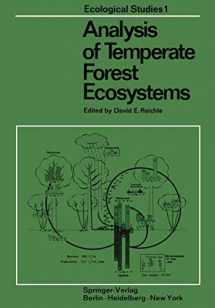
Analysis of Temperate Forest Ecosystems (Ecological Studies)
ISBN-13:
9783540047933
ISBN-10:
354004793X
Edition:
First Edition
Author:
David E. Reichle
Publication date:
1970
Publisher:
Springer-Verlag New York
Format:
Hardcover
304 pages
FREE US shipping
Book details
ISBN-13:
9783540047933
ISBN-10:
354004793X
Edition:
First Edition
Author:
David E. Reichle
Publication date:
1970
Publisher:
Springer-Verlag New York
Format:
Hardcover
304 pages
Summary
Analysis of Temperate Forest Ecosystems (Ecological Studies) (ISBN-13: 9783540047933 and ISBN-10: 354004793X), written by authors
David E. Reichle, was published by Springer-Verlag New York in 1970.
With an overall rating of 4.1 stars, it's a notable title among other
books. You can easily purchase or rent Analysis of Temperate Forest Ecosystems (Ecological Studies) (Hardcover) from BooksRun,
along with many other new and used
books
and textbooks.
And, if you're looking to sell your copy, our current buyback offer is $0.38.
Description
A series of concise books, each by one or several authors, will provide prompt, world-wide information on approaches to analyzing ecological systems and their interacting parts. Syntheses of results in turn will illustrate the effectiveness, and the limitations, of current knowledge. This series aims to help overcome the fragmen tation of our understanding about natural and managed landscapes and water- about man and the many other organisms which depend on these environments. We may sometimes seem complacent that our environment has supported many civilizations fairly well - better in some parts of the Earth than in others. Modern technology has mastered some difficulties but creates new ones faster than we anticipate. Pressures of human and other animal populations now highlight complex ecological problems of practical importance and theoretical scientific interest. In every climatic-biotic zone, changes in plants, soils, waters, air and other resources which support life are accelerating. Such changes engulf not only regions already crowded or exploited. They spill over into more natural areas where contrasting choices for future use should remain open to our descendents-where Nature's own balances and imbalances can be interpreted by imaginative research, and need to be.


We would LOVE it if you could help us and other readers by reviewing the book
Book review

Congratulations! We have received your book review.
{user}
{createdAt}
by {truncated_author}


